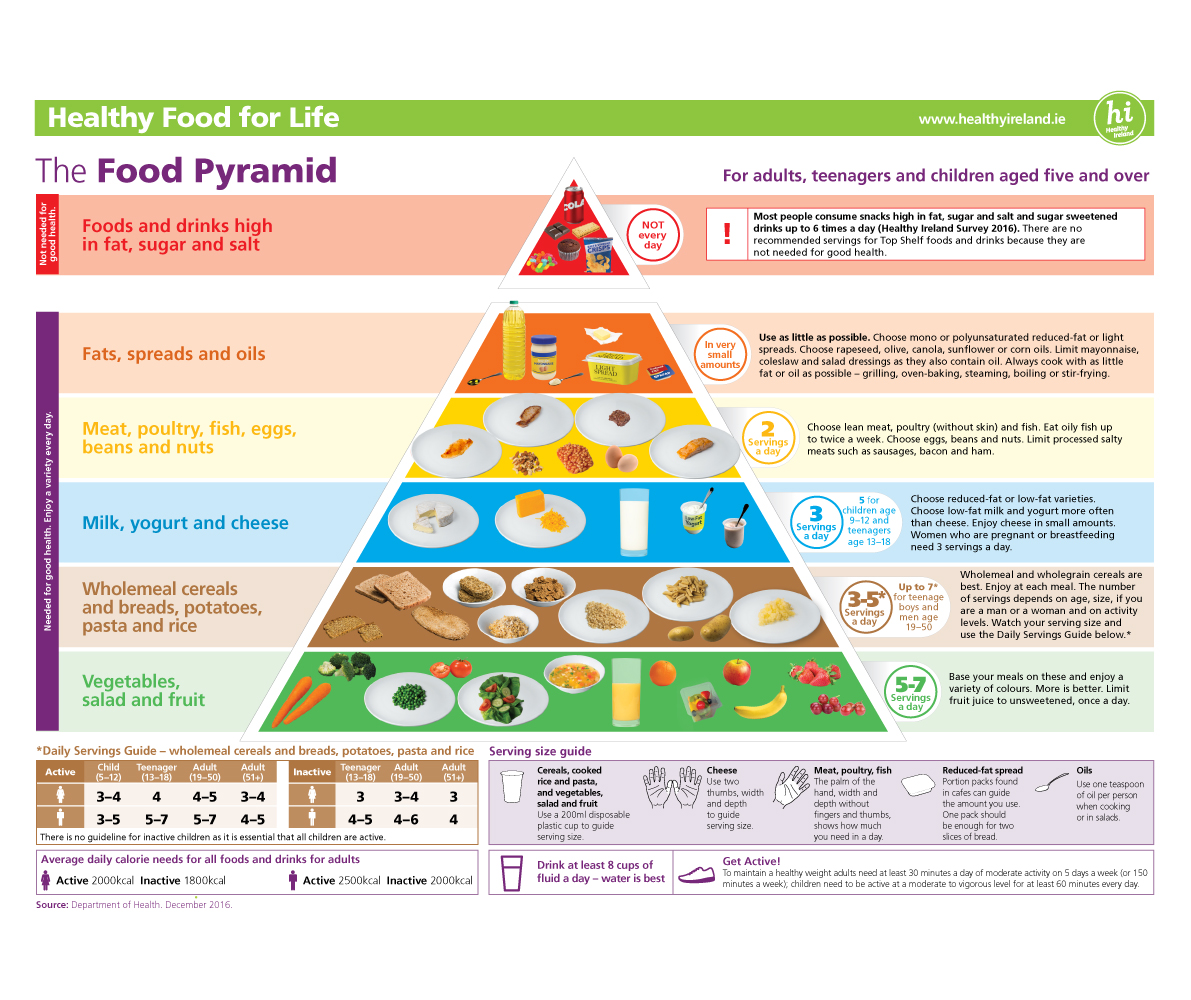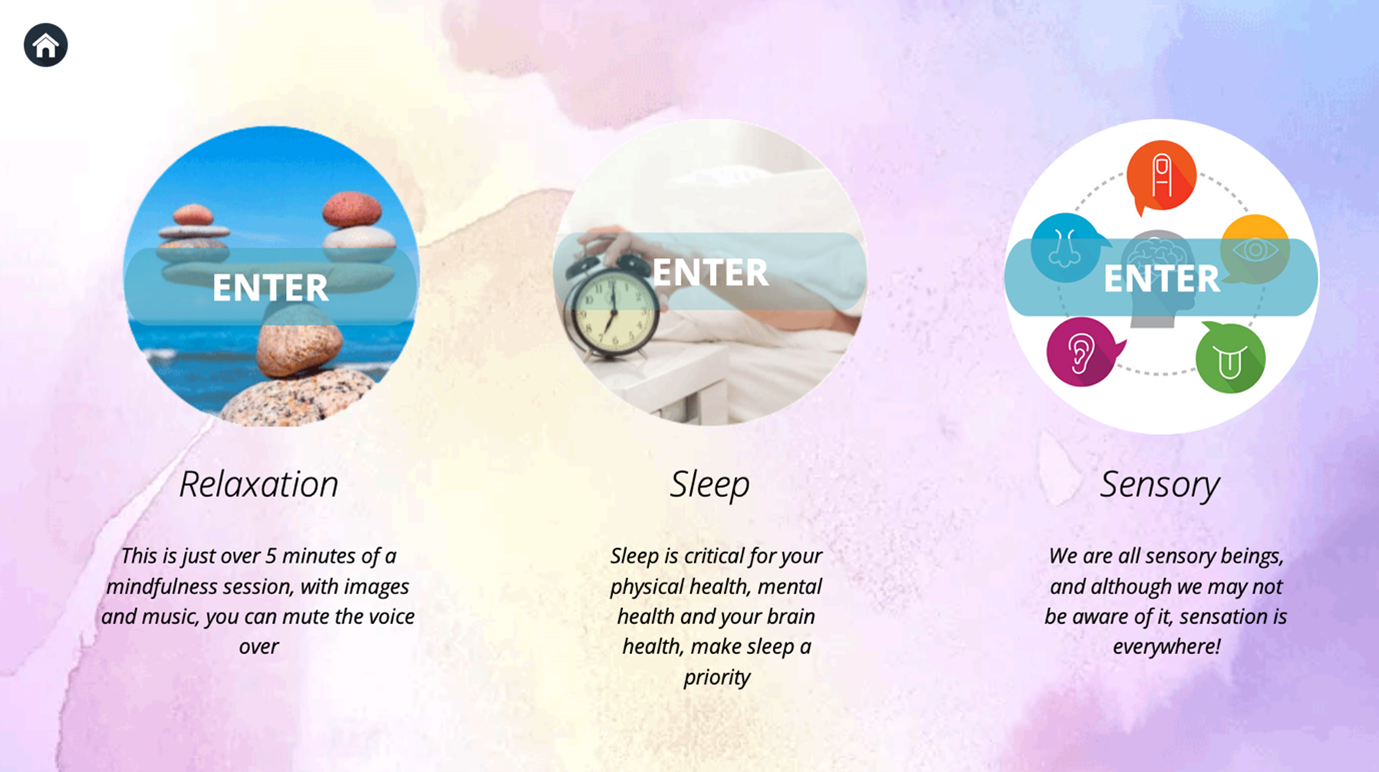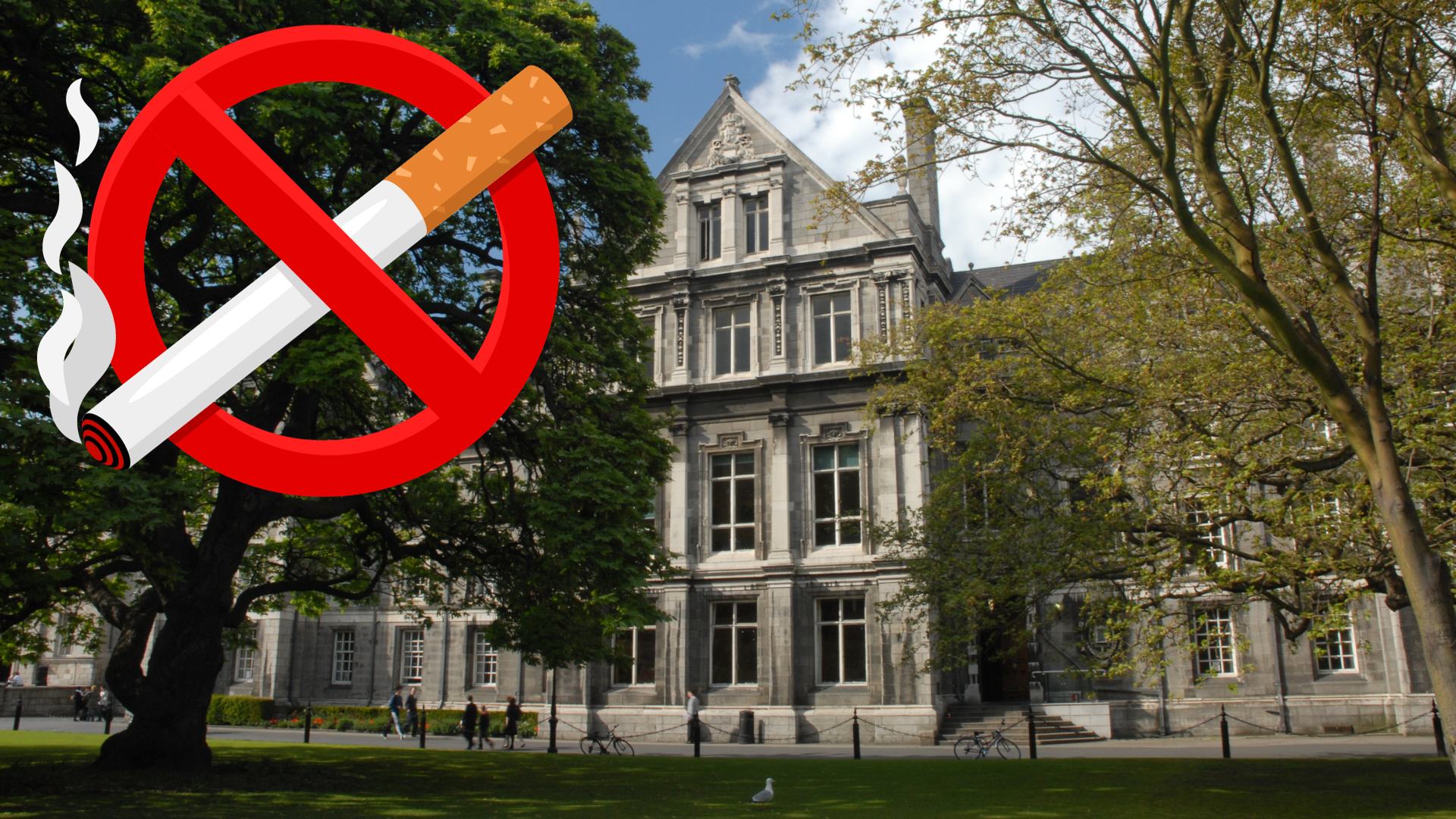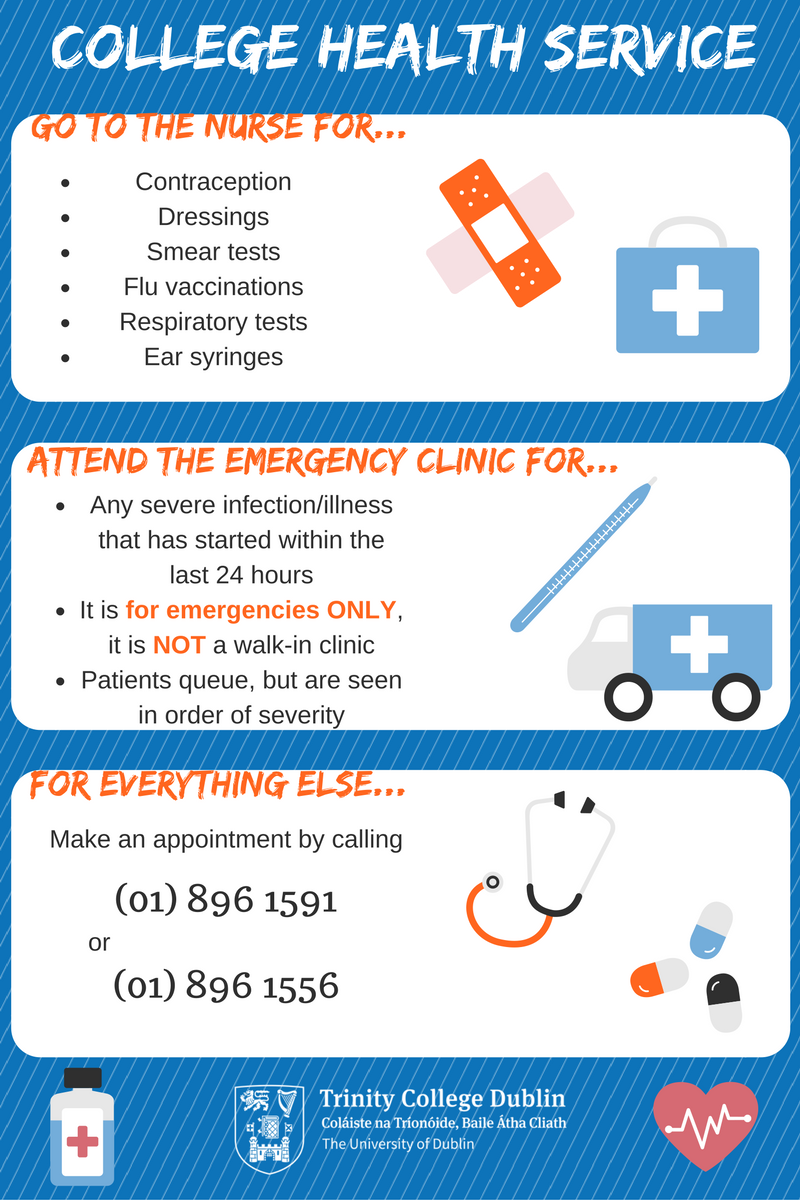Trinity In Twelve Weeks
- Food & Nutrition
- Sleeping
- Exercising
- Illness
- Tobacco
- Alcohol
Student Blogs
Sophister students share their thoughts on each week's theme and topics.
Grace Whelan - Human Health and Disease
By Week 5, the semester starts to feel real. The early-semester optimism you had about balanced meals, early nights, and tidy notes (embodying the influencer lifestyle) begins to collide with the reality of assignments, extracurriculars, and long evenings in the library (or the Pav). Your body starts sending little reminders that it’s not a machine: tired eyes, sore throat, brain fog, fatigue. This is the point in the term where looking after your body stops being optional and starts being essential.
Food & Nutrition
You can only run on caffeine and instant noodles for so long. Around Week 5, I always feel the dip - when too many takeaways and not enough real food adds up. The trick isn’t perfection, it’s practicality. Keep one base ingredient ready (like pasta, rice, or wraps) and one easy protein (tuna, eggs, chickpeas). Trinity’s location is ideal, you can grab fresh fruit and veg at Dunnes or Lidl in under 10 minutes. Cooking once or twice a week and freezing meals saves both money and stress. My go-to is taco bowls or pasta - high protein, reheat-friendly, and forgiving if you forget about it in the fridge for a few days.
Sleep
Every student knows sleep is important, but it’s always the first thing sacrificed (for me anyway). Week 5 is exactly when your sleep debt starts catching up with you. Pulling one late night to finish an essay is fine, but pulling three back-to-back is where you start losing focus and getting run down. I’ve learned to protect a minimum of 7 hours, especially before training or lab days. If you can’t fall asleep, step away from the screen for 20 minutes before bed — read, stretch, do pushups or listen to a podcast. It’s boring advice, but your brain (and mood) will thank you.
Exercise
You don’t need to be on a varsity team to move your body. Even 20 minutes of something you enjoy like a walk along the Liffey, a yoga class in the Sports Centre, or kicking a ball on College Park resets your energy and focus. During midterm pressure, exercise isn’t just “fitness”; it’s maintenance. Personally, I find sport keeps my schedule anchored. Even when the week feels chaotic, knowing I’ll train Monday, Wednesday, and Friday grounds me.
Illness
The infamous “freshers’ flu” usually peaks around now, but it can hit anyone who’s overworked and underslept. Keep your immune system happy: eat real food, drink water, sleep, and take breaks. Don’t be afraid to rest - missing one night out beats dragging yourself through a week half-sick. Trinity’s Student Health Centre is there for a reason; if you’re feeling run down, it’s better to check in early than let it spiral.
Tobacco & Alcohol
Let’s be honest, Trinity social life often revolves around pubs and nights out. There’s nothing wrong with enjoying that, but it helps to notice when “a few drinks” becomes a coping mechanism. Alcohol is a depressant; it can mess with your sleep and energy for days afterwards. I’ve found that swapping every second drink for water (or a mocktail) makes a big difference.
As for smoking - many students pick up “social smoking” without thinking, but it’s worth being mindful. Tobacco (and vapes) are sneaky energy thieves. Week 5 is stressful enough without adding a nicotine crash.
The Bigger Picture
By this stage in the semester, it’s easy to feel stretched thin. The library’s packed, deadlines are looming, and there’s pressure to keep up socially. But the truth is, your body is your foundation for all of it. When you take care of it by eating, moving, resting, and being kind to it, everything else in your life runs smoother.
So this week, check in with yourself. When was your last proper meal? How many hours did you sleep last night? When’s the last time you did something that wasn’t academic? The answers might explain why you’re feeling off, and the fixes are often simpler than they seem.
Looking after your body isn’t about being perfect; it’s about giving yourself enough fuel to make it through the semester well, not just barely.
Food & Nutrition
Healthy Eating
Safefood is a government body which works to promote awareness and knowledge of food safety and nutrition. Check out some of their tips on how to eat more healthily:
- Eat lots of fruit and vegetables – They are packed with nutrients, and help to reduce your risk of developing certain health conditions. Try to have 5 portions of fruit and vegetables a day and your body will thank you for it!
- Eat plenty of starchy foods – These are full of energy and fibre. Wholemeal and wholegrain varieties are best, and examples include rice, pasta, potatoes, and bread.
- Eat protein-rich foods – They are important for your development and growth. Sources include poultry, red meat, fish, eggs, beans, nuts, and lentils.
- Get your omega-3 fatty acids – These are found in oily fish like salmon and mackerel, as well as nuts and seeds, and are important for keeping your heart healthy.
- Get your daily dairy intake - This is really important for students as dairy is a source of calcium, which contributes to the development of healthy bones and teeth. Food such as milk, yoghurt, and cheese are all sources of dairy. Try to choose low-fat varieties where possible.
- Don’t skip breakfast – Breakfast is so important. Not only will it keep you full during those early morning lectures, but it also kick-starts your metabolism. A handy go-to breakfast is a bowl of porridge topped with fruit and nuts.
- Cut down on saturated fat and salt – It’s ok to have a takeaway every once in a while, but usually they’re full of saturated fat and salt. Processed or pre-prepared food (even from the supermarket) can also be loaded with more saturated fat and provide less nutritional value than we expect.
- Cut down on sugar and caffeine, and drink plenty of water – Drinking fizzy drinks, energy drinks, and eating sweets and treats affects your teeth and will leave your energy level yo-yoing. Instead, stay hydrated and alert by drinking plenty of water, and try snacking on fruit and nuts.
What To Buy
No matter what your tastes, having certain (cheap!) things in your cupboard, fridge, and freezer will allow you to make any number of different meals. Keep your cupboard stocked, and buy fresh food weekly when you need it.
Meat can be expensive, but your local butcher may offer student deals, and remember that it is often cheaper to buy in bulk. You can freeze meat for up to 6 months - just leave it in the fridge the night before you want to use it. You might also try out plant-based sources of protein like tofu, lentils, nuts, etc.
Cupboard Staples
- Cooking oil (olive and sunflower)
- Pasta
- Rice
- Tinned tomatoes or passata
- Beans (baked and kidney)
- Soup (cans & cup-a-soup)
- Tinned tuna
- Salt & pepper
- Onions
- Garlic
- Soy sauce
- Coconut milk
- Potatoes
- Chilli flakes or powder
- Mixed herbs
- Stock cubes (vegetable or chicken if you're only buying one type)
- Curry powder or paste
- Tea & coffee
- Porridge oats
- Sugar
Fresh Food
- Butter
- Milk
- Eggs
- Vegetables
- Fruit
- Meat (if desired)
- Cheese
- Bread
Frozen Food
- Vegetables (peas, sweetcorn, or mixed)
- Potatoes (hashbrowns, waffles, chips, or wedges)
What To Cook and How To Cook It
The ingredients above will give you the opportunity to make a wide variety of meals, but you also need to know what to do with them! Follow the links below to find some basic recipes and meal planning resources for students that will ease you into cooking healthy meals for yourself. Then, when you've gained some confidence, branch out and browse online for thousands more. You'll also need some basic cooking implements:
- A non-stick frying pan (just remember never to use metal implements or scourers on anything non-stick!)
- A pot/saucepan
- A spatula (plastic/silicone so it doesn't ruin the non-stick pan!)
- A large spoon (plastic/silicone or wooden)
- A few good sharp knives for chopping
- A chopping board (or two if you want to use one for meat/fish only)

Sleeping
Why Is Sleep Important?
A good night's sleep makes everyone feel better (and it's worth it for that alone!), but there are other benefits to getting good sleep regularly, too. Getting regular good sleep improves your memory, sharpens your attention, lowers stress, and can help to improve your grades, enhance your athletic performance, and boost your general health. That's a lot of potential benefit from something you do every night!
How To Get a Good Night's Sleep
- Keep to a sleep schedule
Going to bed and getting up at roughly the same time every day (even weekends!) will help regulate your body clock, making it easier to fall asleep. - Adopt bedtime rituals
A relaxing bedtime ritual - eg. meditation, reading, stretching, drinking a herbal or decaf tea - can help separate your sleep time from your daily activity and prepare your mind to rest. - Avoid naps
If you're having trouble sleeping at night, it can be tempting to have a nap during the afternoon to help deal with the tiredness from inadequate rest. However, having an afternoon nap can make it more difficult to sleep that night, trapping you in a vicious cycle. - Exercise Daily
Getting some exercise during the day will make it easier to sleep at night - just don't exercise too soon before bed! - Make sure your sleep environment is appropriate
Your room should be cool and free of light or noise that will disturb your sleep. If your charger or a device is lighting up the room, consider moving it outside or using a sleep mask; if background noises are bothering you, try earplugs. - Use a comfortable mattress and pillows
Make sure your mattress and pillows are comfortable and keeping your body and neck properly supported. If you often wake with a sore neck or back, experiment with different pillows, mattresses toppers, or even a new mattress (if possible!).
Relaxation Resources
Mindfulness and Relaxation Practices from SCS
The Student Counselling Service have created a suite of mindfulness and relaxation practices which you can access anytime, anywhere.
Reset, Recharge, and Rebalance with HTOT
College life can be full-on — deadlines, late nights, endless screens, and little time to rest. But good sleep and relaxation aren’t luxuries; they’re essential for keeping your brain sharp, your mood steady, and your body strong.
The Healthy Trinity Online Tool makes it easy to take control of your wellbeing.
- Discover why sleep matters - learn simple habits for better sleep hygiene and find out how even small changes can boost your focus, energy, and mental health.
- Relax in five minutes - unwind with our guided mindfulness session, complete with soothing images and music (voiceover optional).
- Explore your senses - reconnect with the world around you and rediscover calm through everyday sensory experiences.
You don’t need hours — just a few moments to reset can make a real difference.
Visit the Sleep and Relaxation section today and start building healthy habits that help you think clearer, feel better, and sleep deeper.
Use Chrome to log in to Blackboard. Use the 'Assist' tab on the left to find the ‘Healthy Trinity Online Tool.’ Once you have accessed the Tool, click on the 'Relax, Sleep & Sensory' section on the homepage.

Relaxing Music
Some people find that music helps them to sleep. Just make sure that you're choosing relaxing music like the sample below:
Exercising
Tips for Getting More Daily Exercise
Getting enough exercise doesn't have to mean regular high-intensity training with a team or going to the gym every day. For those of you who do and enjoy those things, that's great - just remember to take care of your body! For the rest of you, all you need is 20-25 minutes of moderate-intensity exercise a day, or 30 minutes five times a week, to reach the HSE's minimum activity guidelines for adults. Some easy ways to hit that benchmark are:
- Walking
Skip the bus and walk into College - or even just part of the way! - Cycling
Get a bike or use DublinBikes - you might actually find that you get to places more quickly than you would on the bus! - Short Home Workouts
Download a workout app, or find a good workout plan or video, and exercise from the comfort of your own room. - Start Running
You could try a Couch to 5K programme! - Make Small Changes To Your Routine
For example, take the stairs instead of using a lift. - Don't Put Off Active Chores
You'd be amazed how much of a workout vacuuming or dusting can be!
Trinity Sport Facilities
Sports Centre
As a Trinity student, you have a fantastic Sports Centre with a gym, pool, climbing wall, and fitness classes at your fingertips. Activate your membership online, or by bringing your student ID card to the main reception, and explore what the Sports Centre has to offer.
Did you know? If you're nervous about going to the gym for the first time, you can make an appointment with one of the Trinity Sport personal trainers for a free fitness consultation to help get you started! Email sport@tcd.ie to learn more.
Outdoor Campus Facilities
Our outdoor campus facilities include:
- College Park
- Rugby Pitch
- Astroturf Tennis and Futsal Courts
You can book to use both the Tennis and Futsal Courts on the Trinity Sport App.
Printing House Square Sports Facilities
Printing House Square's state-of-the-art indoor sporting facilities have been designed to cater to a range of sports and activities, including squash, GAA handball, racquet ball, and olympic target shooting.
Off-Campus Outdoor Facilities
If you are or become involved in a Trinity sports club, chances are you will have some training sessions at one of our off-campus outdoor facilities.
Our main off-campus sports hubs are:
Each of these facilities can be reached using public transport.
Learn More About Our Sports Facilities
Sports Clubs
Each of our sports clubs offers the opportunity to socialise whilst getting active.
You'll find details about all of the Trinity clubs at the link below, and - remember - you can join at any time during Semesters 1 and 2!
Illness

College Health Service
As a Trinity student, you have access to the College Health Service which is based in Printing House Square. Visits to the doctors and nurses are free, but there may be charges for certain services - for example, travel vaccinations. There is also a fee of €20 to visit the physiotherapist.
All appointments with the College Health Service must be booked in advance (see details on Student Emergency Clinics below).
To book an appointment or make an enquiry, phone any of the numbers listed below on weekdays between 9am and 1pm, and from 2pm to 4:30pm.
- (+353) 01896 1591
- (+353) 01896 8555
- (+353) 01896 1556
Student Emergency Clinics
The College Health Service runs emergency clinics every weekday from 9am and 2pm. You will need to phone the Service to book into this clinic (01896 1591, 01896 1556, or 01896 8555). Students are seen by severity of condition which is assessed over the phone.
This is not a walk-in clinic.
The emergency clinics are only to be used for emergencies, eg. if you develop a sudden or urgent health condition. For all other cases, please book an advance appointment.
Missing College Due To Illness
There will be times when you will need to stay home from College because of illness. Students can self-certify for 3 days, and after that you will need a doctor's note (which can be obtained from either your own GP, or the College Health Service).
If you need to miss a tutorial or a seminar, let your lecturer or TA know in advance. If you are too ill to complete an assignment on time, you need talk to your Tutor and/or your School rather than just letting the deadline pass. Make sure to link in with someone in your class about what you will/have missed if you're sick.
Tips For Keeping Yourself Healthy Through Winter
- Wash your hands thoroughly
- Cover your coughs & sneezes with a tissue
- Eat a balanced diet
- Get a flu vaccination (you can make an appointment with the College Health Service)
- Get enough sleep
- Get some exercise
- Mind your mind (in addition to offering one-to-one counselling, the Student Counselling Services provide and oversee a range of group and peer supports and mental health resources).
Tobacco
Trinity is a tobacco free campus, and we ask people to refrain from smoking both indoors and outdoors on our campus. It means fresh air and a clean campus for all!
Since Healthy Trinity first introduced tobacco free zones in 2016, we’ve seen an 83% reduction in smoking. Watch out for Tobacco Free Trinity campaigns and ambassadors on campus, and learn more on their website. The Tobacco Free Trinity webpages also link to a number of useful and free resources to help you stop smoking or reduce your tobacco consumption.
Tobacco Free Trinity
Alcohol

Sensible Drinking
The 2024 Healthy Ireland survey indicates that 75% of 15-24 year olds and 78% of 24-34 year olds in Ireland drink. Drinking has become part of our culture, and it is perceived by many to increase one's sociability, relaxation, and enjoyment.
Drinking sensibly means drinking not too much, not too often, and not too fast.
The HSE's low-risk alcohol guidelines are that you do not drink more than 11 standard drinks per week if you are a woman, and 17 standard drinks per week if you are a man.
Under the HSE's guidelines, a standard drink has 10g of pure alcohol. This is equivalent to:
- half a pint of beer, stout, or cider (284ml, 4.5% ABV)
- a single measure of spirits (35.5ml, 40% ABV)
- a small glass of wine (100ml, 12.5% ABV)
- an alcopop (275ml, 4% ABV)
It is recommended that you drink no more than 6 standard drinks on any one occasion, and that you have at least 2 or 3 alcohol-free days per week.
The HSE defines drinking more than 6 standard drinks on a single occasion as binge drinking. Binge drinking poses risks to your health and wellbeing.
To help you stick within sensible drinking limits, remember:
- Don't let yourself be pressurised into drinking more than you intend.
- A good social life does not need to revolve around alcohol - get involved in sport, societies, or other activities.
- Space out your alcoholic drinks - perhaps with a glass of water or a soft drink. Slow down, what's the rush?
- Have something to eat before or with your drink.
- Avoid drinking games as they lead to excess.
- Excess alcohol consumption leads to lack of judgement and increases risk taking. Studies, such as the 'Clan Survey' of eighteen Irish colleges, show that excess drinking increases the risk of accidents, physical injury, and sexual risk taking.
Alcohol can be enjoyable and make you feel confident, but it can also wreck your judgement.
Low and No Alcohol Activities
In addition to many of the activities run by our student societies and clubs, you'll find lots of low and no alcohol things to do in Dublin - regardless of time of day. Have a look at the list below for just some of the options available, and maybe suggest them to friends, classmates, or teammates the next time you're making plans!
- Several cafés/coffee shops in the city centre now stay open past 7pm.
The latest closing time we're currently aware of is 11pm. - At last count, there are more than 20 free museums/attractions in Dublin.
You can reach both the National Museum and the National Gallery in less than 2 minutes from campus. - Many of the city's cinemas offer student discounts.
In addition to the biggest blockbusters, you'll find screenings of independent films, documentaries, and more! - Current craft-focused offerings around Dublin include pottery making and painting, rug tufting, and life drawing.
Whilst some activities have high ticket prices or entry fees, you'll likely be able to find community-run alternatives. - Darts, axe-throwing, go-karting, pool, and mini-golf could be fun options if you're looking for some lighter physical activity!
Just make sure to pay attention to any safety instructions! - Sea-swimming remains incredibly popular, and there is a new wave of saunas popping up across the suburbs.
Hop on the DART at Pearse Street, and you can be at the beach in 15 minutes! - Make use of Dublin's fabulous parks.
Bring a picnic, go for a run, bring a book - the choice is yours!
If you do fancy a pub/bar environment, why not check out spots which have more extensive low/no-alcohol options? There are also a couple of specialist no alcohol bars in the city.


